| ||
The 2024 elections in the European Union include European, national and regional elections in the EU member states.
| ||
The 2024 elections in the European Union include European, national and regional elections in the EU member states.
The 2024 European Parliament election is scheduled to be held on 6 to 9 June 2024. [1] This will be the tenth parliamentary election since the first direct elections in 1979, and the first European Parliament election after Brexit. [2] [3]
| State | Date | Parliament before | Head of Government before | Party | EP Group | Parliament after | Head of Government after | Party | EP Group | ||||
|---|---|---|---|---|---|---|---|---|---|---|---|---|---|
| Portugal | 10 March |  | Antonio Costa | PS | S&D |  | Luís Montenegro | PSD | EPP | ||||
| Croatia | 17 April |  | Andrej Plenković | HDZ | EPP |  | Andrej Plenković | HDZ | EPP | ||||
| Belgium | 9 June | | Alexander De Croo | Open Vld | RE | TBD | |||||||
| Bulgaria | 9 June |  | Dimitar Glavchev (caretaker) | Ind. | Ind. | ||||||||
| Austria | 29 September |  | Karl Nehammer | ÖVP | EPP | ||||||||
| Lithuania | 13 October |  | Ingrida Šimonytė | TS–LKD | EPP | ||||||||
| Romania | 8 December | | Marcel Ciolacu | PSD | S&D | ||||||||
| State | Date | President before | Party | EP Group | President after | Party | EP Group | ||||
|---|---|---|---|---|---|---|---|---|---|---|---|
| Lithuania | 12 May 26 May | Gitanas Nausėda | Ind. | Ind. | Gitanas Nausėda | Ind. | Ind. | ||||
| Romania | 15 September 29 September | Klaus Iohannis | PNL | EPP | TBD | ||||||
| State | Date | President before | Party | EP Group | President after | Party | EP Group | ||||
|---|---|---|---|---|---|---|---|---|---|---|---|
| Finland | 28 February 11 February | Sauli Niinistö | National Coalition | EPP | Alexander Stubb | National Coalition | EPP | ||||
| Slovakia | 23 March 6 April | Zuzana Čaputová | PS | RE | Peter Pellegrini | HLAS–SD | S&D (suspended) | ||||
| Croatia | December | Zoran Milanović | SDP | S&D | TBD | ||||||
All three regions will hold elections.
All thirteen regions will hold elections.
All nineteen counties and Budapest will hold elections.
Five regions will hold elections.
All sixteen provinces held elections.

The Council of the European Union, often referred to in the treaties and other official documents simply as the Council, and informally known as the Council of Ministers, is the third of the seven Institutions of the European Union (EU) as listed in the Treaty on European Union. It is one of two legislative bodies and together with the European Parliament serves to amend and approve or veto the proposals of the European Commission, which holds the right of initiative.

The European Free Trade Association (EFTA) is a regional trade organization and free trade area consisting of four European states: Iceland, Liechtenstein, Norway and Switzerland. The organization operates in parallel with the European Union (EU), and all four member states participate in the European Single Market and are part of the Schengen Area. They are not, however, party to the European Union Customs Union.
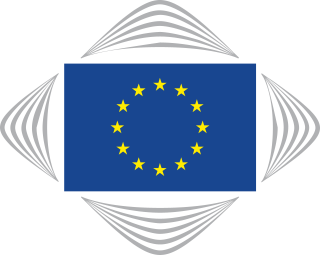
The European Committee of the Regions (CoR) is the European Union's (EU) assembly of local and regional representatives that provides sub-national authorities with a direct voice within the EU's institutional framework.
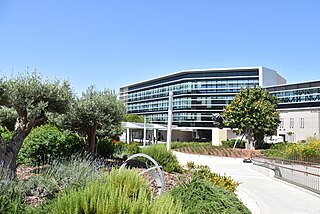
The European Union Intellectual Property Office (EUIPO) is a decentralised agency of the EU responsible for the registration of EU-wide unitary trade marks and industrial design rights. These exist alongside the intellectual property rights of individual EU member states, so the agency also works to harmonise EU-wide and national registration processes. Other responsibilities include the administration of the rights of certain products in the EU to carry geographical indications.
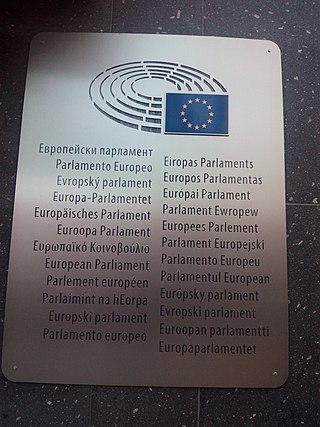
The European Union (EU) has 24 official languages, of which three – English, French and German – have the higher status of "procedural" languages of the European Commission. Irish previously had the lower status of "treaty language" before being upgraded to an official and working language in 2007. However, a temporary derogation was enforced until 1 January 2022. The three procedural languages are those used in the day-to-day workings of the institutions of the EU. The designation of Irish as a "treaty language" meant that only the treaties of the European Union were translated into Irish, whereas Legal Acts of the European Union adopted under the treaties did not have to be. Luxembourgish and Turkish, which have official status in Luxembourg and Cyprus, respectively, are the only two official languages of EU member states that are not official languages of the EU. In 2023, the Spanish government requested that its co-official languages Catalan, Basque, and Galician be added to the official languages of the EU.
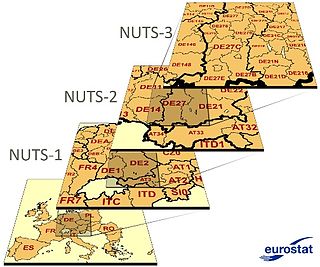
Nomenclature of Territorial Units for Statistics or NUTS is a geocode standard for referencing the administrative divisions of countries for statistical purposes. The standard, adopted in 2003, is developed and regulated by the European Union, and thus only covers the EU member states in detail. The Nomenclature of Territorial Units for Statistics is instrumental in the European Union's Structural Funds and Cohesion Fund delivery mechanisms and for locating the area where goods and services subject to European public procurement legislation are to be delivered.

The apportionment of seats within the European Parliament to each member state of the European Union is set out by the EU treaties. According to European Union treaties, the distribution of seats is "degressively proportional" to the population of the member states, with negotiations and agreements between member states playing a role. Thus the allocation of seats is not strictly proportional to the size of a state's population, nor does it reflect any other automatically triggered or fixed mathematical formula. The process can be compared to the composition of the electoral college used to elect the President of the United States of America in that, pro rata, the smaller state received more places in the electoral college than the more populous states.

European Union citizenship is afforded to all nationals of member states of the European Union (EU). It was formally created with the adoption of the 1992 Maastricht Treaty, at the same time as the creation of the EU. EU citizenship is additional to, as it does not replace, national citizenship. It affords EU citizens with rights, freedoms and legal protections available under EU law.
The European Union Special Representatives (EUSR) are emissaries of the European Union with specific tasks abroad. While the EU's ambassadors are responsible for affairs with a single country, Special Representatives tackle specific issues, conflict areas or regions of countries. They answer directly to the High Representative of the Union for Foreign Affairs and Security Policy, currently Josep Borrell.

The European Union Agency for Cybersecurity – self-designation ENISA from the abbreviation of its original name – is an agency of the European Union. It is fully operational since September 1, 2005. The Agency is located in Athens, Greece and has offices in Brussels, Belgium and Heraklion, Greece.
The European Institute of Innovation and Technology (EIT) is an independent body of the European Union with juridical personality, established in 2008 intended to strengthen Europe's ability to innovate. The EIT’s three “core pillars” of activities are: entrepreneurial education programmes and courses across Europe that transform students into entrepreneurs; business creation and acceleration services that scale ideas and budding businesses; and innovation-driven research projects that turn ideas into products by connecting partners, investors, and expertise.

The Roaming Regulation 2022 bans roaming charges (Eurotariff) within the European Economic Area (EEA), which consists of the member states of the European Union, Iceland, Liechtenstein and Norway. This regulates both the charges mobile network operator can impose on its subscribers for using telephone and data services outside of the network's member state, and the wholesale rates networks can charge each other to allow their subscribers access to each other's networks. The 2012 Regulation was recast in 2022.

Albania is on the current agenda for future enlargement of the European Union (EU). It applied for EU membership on 28 April 2009, and has since June 2014 been an official candidate for accession. The Council of the European Union decided in March 2020 to open accession negotiations with Albania.

The European Union has concluded free trade agreements (FTAs) and other agreements with a trade component with many countries worldwide and is negotiating with many others. The European Union negotiates free trade deals on behalf of all of its member states, as the member states have granted the EU has an "exclusive competence" to conclude trade agreements. Even so, member states' governments control every step of the process :

The European Commission's Asylum, Migration and Integration Fund is a funding programme managed by the Directorate-General for Migration and Home Affairs which promotes the efficient management of migration flows and the implementation, strengthening and development of a common approach to asylum and immigration in the European Union. All EU Member States except Denmark participate in the implementation of this Fund. Most of the funds are provided to the EU Member States for activities addressing previously agreed upon themes. A part of the funding is reserved for emergency assistance. A final part is reserved for Union Actions, which are European Commission managed projects that are developed as either calls for proposals, direct awards, procurements, or delegation agreements.
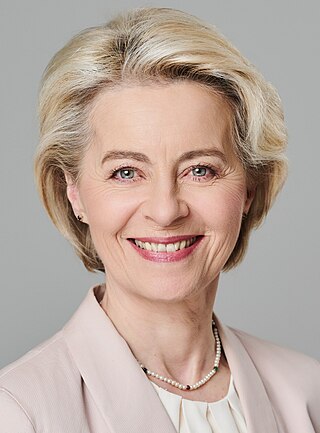
The 2024 European Parliament election is being held from 6 to 9 June. This is the tenth parliamentary election since the first direct elections in 1979, and the first European Parliament election after Brexit. This election will also coincide with a number of other elections in some European Union member states.
The 2024 European Parliament election in Germany is currently being held on 9 June 2024. This will be the tenth parliamentary election since the first direct elections in 1979, and the first European Parliament election after Brexit.
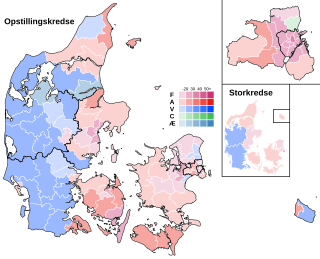
The 2024 European Parliament election in Denmark will be held on 9 June 2024. The elections will be held as part of the wider 2024 European Parliament election, but will not take place in the Faroe Islands or Greenland, which are not part of the European Union.